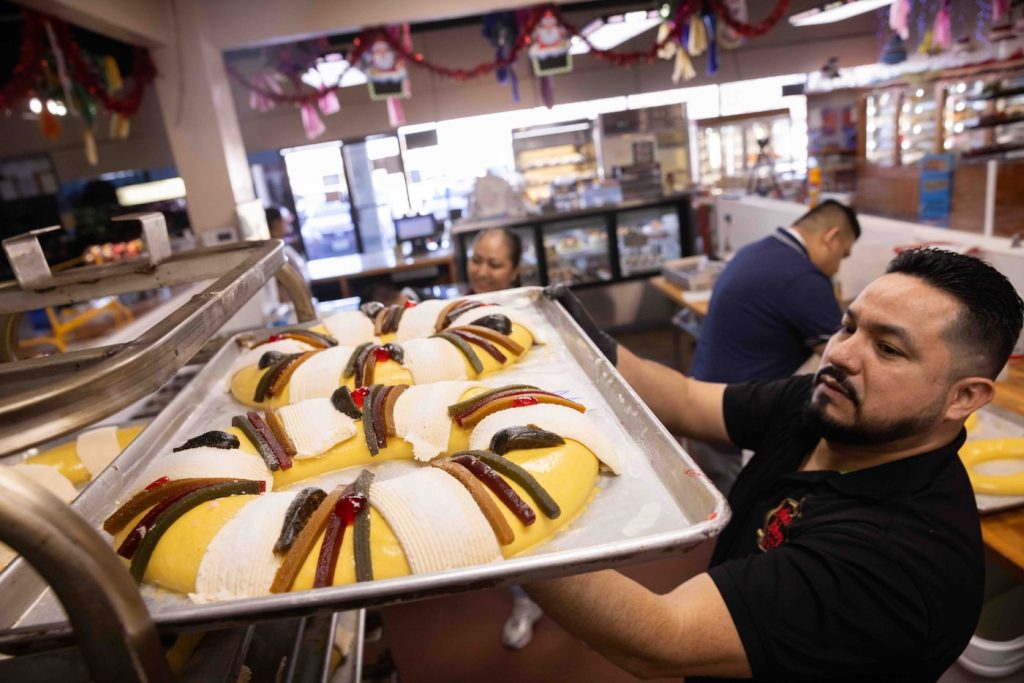By imelda García
Staff Writer
Immediately after the New Year, bakeries all over Mexico go into a frenzy to produce Rosca de Reyes or Pie de Reyes. The tradition, which marks the end of the holiday season, has also taken root in Dallas-Fort Worth’s Hispanic bakeries.
During Three Kings Day celebrations, families gather to cut and eat oval-shaped bread adorned with colorful dried topping and stripes of white sugar. Like king cake, some other food tradition connected to the epiphany, it threads a figure representing the baby that represents the baby Jesus.
“It is a beautiful tradition because we are not just cutting into a cake or a loaf of bread; we are bringing up our culture, our roots,” said Alma Lopez, marketing liaison for Latinos Bakery in Garland. “This means a lot because it is a synonym of faith and hope, and that’s why Mexicans love this tradition so much and always bring it to our tables.”
The origin of the Rosca de Reyes dates back to the 13th century, when a bread with a similar flavor was eaten in Spain and France. The Spanish conquest arrived in Mexico and adhered to the country’s tradition.
The latest food and drink reviews, recipes and info on the D-FW food scene.
Or with:
By signing up you agree to our Terms of Service and Privacy Policy
The piece of bread recalls the biblical story of the three kings’ (or wise men’s) journey from the East to Jerusalem to find Jesus and bring him offerings of gold, frankincense and myrrh. Epiphany, the holiday commemorating the kings’ arrival, is celebrated on Jan. 6.
Each element of the rosca carries meaning, according to Mexico’s Ministry of Culture. The oval shape represents the infinite circle of God’s love; the colorful dried fruit symbolizes the jewels on the crowns of the three kings; and the hidden baby Jesus figurines inside the bread represent how his parents hid Jesus to prevent him from being killed by Herod.
In Mexico, children write letters to the kings, telling them all their wishes and dreams. It’s similar to the Santa Claus tradition in the U.S. Kids put the letters in one of their shoes on the night of Jan. 5, ahead of Epiphany. The next day, their gifts await for them when they wake up, and in the evening, families gather to share the rosca.
According to custom, whoever discovers the figure of Jesus in his portion of Rosca is considered a type of godfather for the baby Jesus. The user will have to take the figure to church on February 2, known as Candlemas, a Catholic dinner that commemorates the presentation of Jesus in the temple.
The person that discovered the Jesus figurine also has to provide tamales to the people who invite them for the rosca cutting on Feb. 2.
Today, other top people practice the tamale part of the culture on February 2, but omit the devout rite.
“As immigrants, we cross the border, but we don’t cross it alone. We cross with our roots, with what is dearest to us. Our culture and all that is family, we bring it with us,” Lopez said. “Our family is here in the rosca that we break every Jan. 6 because it is a symbol of friendship, love, and family.”
The Epiphany season is one of the best for Mexican bakeries in Dallas-Fort Worth because of the business it brings.
For the Latin bakery, the call for Rosca de Reyes is a testimony to the expansion of the garland and the region.
The company opened its doors in December 2020 and, first of all, cooked a maximum of one hundred threads of kings. Over time, the company has developed. Approximately 4 years later, Latinos Bakery manufactures more than six hundred threads that sells in five or six days.
“This is one of the most beautiful traditions for us,” said Jose Luis Hernandez, one of the owners of the Latinos bakery.
Hernández founded the company with partners Francisco Tapia and Lorenzo Luna. The three of them worked together in a Hispanic supermarket and after several years, they took the step of opening their own business.
“My total circle of relatives is a baker, and it is very good to have this business here and bring this culture of the epiphany day here also in the United States,” said Hernández.
Latinos Bakery is located at 4750 N Jupiter Rd in Garland. Facebook. com/Latinosbakery.
This story is from D-FW Sabores, a series committed to finding original Mexican cuisine in North Texas, dish by dish, region by region.
Imelda García is a journalist covering Hispanic food and Latino culture trends. She previously worked as a reporter for Al Día, the Spanish-language publication of The DMN. Before working at The DMN, she developed most of her career in national outlets in México.

